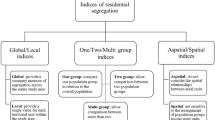Abstract
In his “Space, supervenience and substantivalism”, Le Poidevin proposes a substantivalism in which space is discrete, implying that there are unmediated spatial relations between neighboring primitive points. This proposition is motivated by his concern that relationism suffers from an explanatory lacuna and that substantivalism gives rise to a vicious regress. Le Poidevin implicitly requires that the relationist be committed to the “only x and y” principle regarding spatial relations. It is not obvious that the relationist is committed to this principle in such a context. An additional motivation for Le Poidevin's argument, that space should be considered to be discrete, is that he believes that substantivalists are committed to a vicious regress. I show that the regress is in fact not of the vicious variety. These two main arguments show that Le Poidevin's suggestion that we drop the density postulate for space is unnecessary.
Similar content being viewed by others
Notes
One could even argue that the move to atomistic space obviates the argument against relationism.
This is another concern that Le Poidevin raises. From pp. 195–96: We can adopt a conventionalism with regards to measurement and deny that there is any fact of the matter as to whether two distances are equivalent independent of our measurement of them. This would save the relationist from the argument in fn 3. Since the conventionalist takes equivalences to depend upon the measuring system chosen, the inference that the relationist makes about the distance between A and C based on the distances between A and B and B and C is entirely a feature of the measuring system that we have chosen, not a fact about relations in the world.
What follows come from pp. 193–4.
Though this principle requires adherence to a type of a correspondence theory of truth, the debate about whether it’s acceptable is beside the point being made here.
I am following Le Poidevin’s suggestion that R1 and R4 have been replaced by R5 and what we can call R8, the relation that supervenes on R6 and R7 and is a second truth maker for (4).
From here on out I will call “R1 before the introduction of B” simply R1 and “R1 after the introduction of B” \(\operatorname{R} _1^\prime \).
An object undergoes a “Cambridge change” just in case the truth value of a proposition about that object changes. An object undergoes a “mere-Cambridge change” just in case it undergoes a Cambridge change but no properties inherent in the object change.
The principle is modified such that it is can better withstand arguments brought against it. The modifications make it more clear that the principle is not applicable to entities that exist in a mere- Cambridge way, but the details of the modifications are not essential to the point made in the present paper.
To be more perspicuous one may one to express the relation as “childlessly coupled with” but “childless couple” works just as well. I thank Sven Bernecker for this example.
This of course implies a strong version of realism about relations but realism about relations is assumed from the beginning. (Le Poidevin, p. 192).
We can say that the proposition that changed in truth value is the proposition: “The relation ‘childless couple’ holds between Sue and Charles”.
To argue that it was not a Cambridge change but rather a real change (the alternative) would require showing that there are some properties inherent to the relations.
Though it is more precise to talk about the center of the mass of objects, I will forego the cumbersome terminology.
References
Geach, P. (1972). Logic matters. Los Angeles: University of California Press.
Gillett, C. (2003). Infinitism redux? A response to Klein. Philosophy and Phenomenological Research, 66(3), 709–717.
Kingsley, A. C. (2004). The only X and Y principle. Inquiry, 47(4), 338–359.
Klein, P. D. (2003). When infinite regresses are not vicious. Philosophy and Phenomenological Research, 66(3), 718–729.
Le Poidevin, R. (2004). Space, supervenience and substantivalism. Analysis, 64(3), 191–198, July.
Loux, M. J. (2002). Metaphysics: a contemporary introduction (3rd ed.). New York: Routledge.
Russell, B. (1996). Principles of mathematics. New York: Norton.
Author information
Authors and Affiliations
Corresponding author
Rights and permissions
About this article
Cite this article
Conroy, C. No Lacuna and No Vicious Regress: A Reply to Le Poidevin. Acta Anal 23, 367–372 (2008). https://doi.org/10.1007/s12136-008-0037-x
Received:
Accepted:
Published:
Issue Date:
DOI: https://doi.org/10.1007/s12136-008-0037-x




